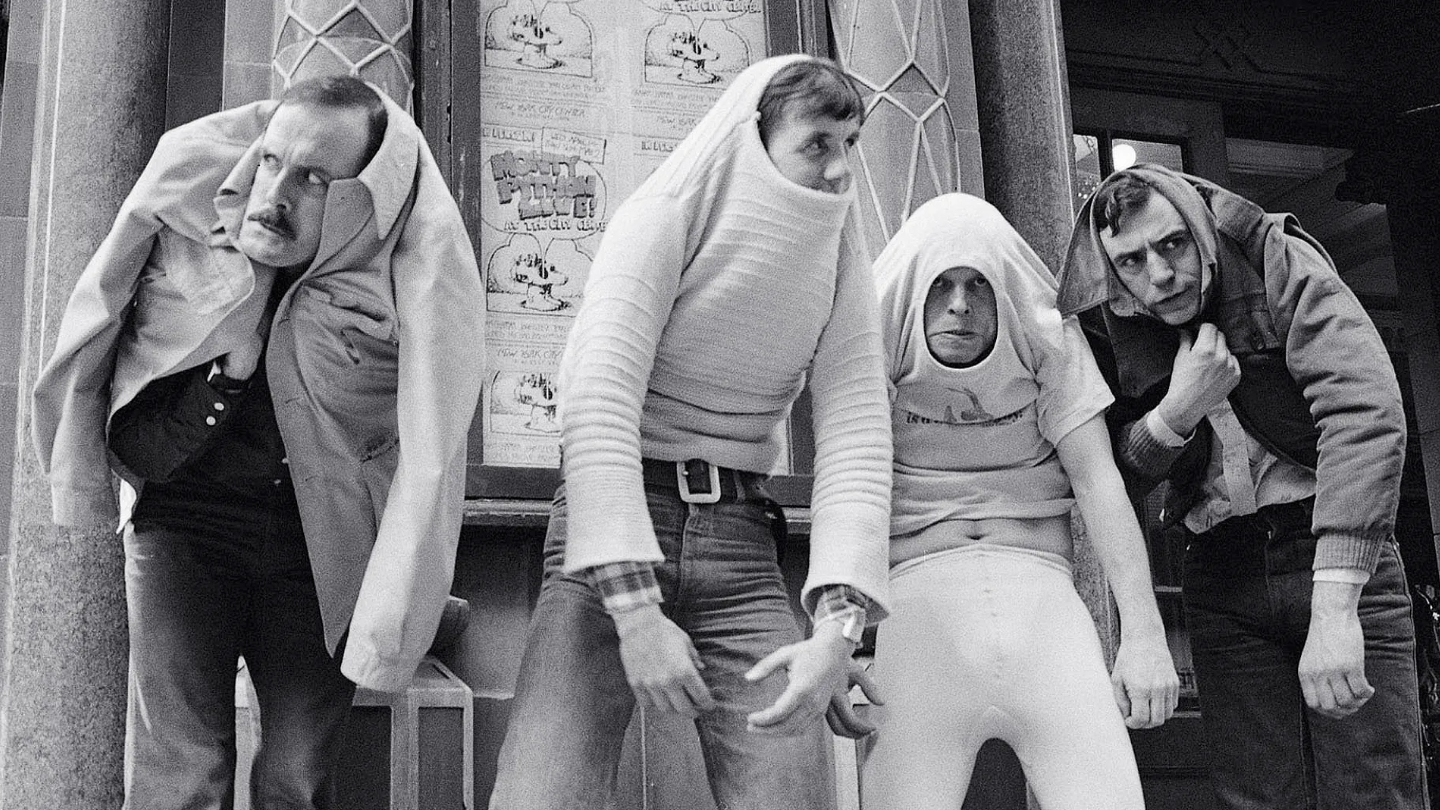Niewiele jest rzeczy równie poważnych jak śmiech.
Wciąż się go chyba jednak nie docenia. O rzeczach istotnych zwykle rozprawia się, przywołując najlepiej jakiegoś Dostojewskiego, ale już nie – oglądając Monty Pythona. A przecież – zauważa John Cleese, jeden z Pythonów – „pomyślcie tylko, ile jest wielkich filmów dramatycznych, i porównajcie to z liczbą wielkich komedii”. Jeśli dysproporcja wypada miażdżąco na korzyść pierwszych, dowodzi to, że „komedia jest nadzwyczajnie trudna. Jest dużo, dużo cięższa niż dramat”.
Komedię zbyt często traktuje się jednak jako zwykłe wygłupy. Tymczasem to przecież w tym, z czego się śmiejemy, nie tylko najjaskrawiej odbijają się, uznawane za poważne, szersze problemy społeczne, ale to w nim ulegają kondensacji.
Bo przyjrzyjmy się chociażby takiej ironii. To przecież nie tylko narzędzie nieźle wspierające komizm, ale też figura myślowa, w której skondensował się charakter ponowoczesności. Łagodność piłującej wszelkie ostrza ironii miała stanowić podstawę demokracji liberalnej. W sojuszu z neoliberalnym rozumieniem rynku za kilka lat miała ona przypieczętować swoją światową hegemonię, budując „globalną wioskę”, w której życie płynąć będzie w takt powszechnego skapywania bogactwa, w błogostanie „końca historii”.
Pokazując, że nie ma już żadnych prawd ostatecznych, a tym samym wspierając różnorodność, ironia miała stanowić skuteczny piorunochron neutralizujący wszelką skrajność, studzący temperaturę sporów i pokazujący, że każdy problem można przegadać bez skakania sobie do gardeł.
Ironia, z definicji skazana na dwoistość, wskazująca na napięcie między tym, co się mówi, a faktycznym sensem wypowiedzi, nadawała się do tego, by rozbijać fundamentalizm jednoznaczności, pokazywać, że świat nie jest taki, jaki się wydaje. Doskonale sprawdzała się więc jako rebeliancka broń przeciwko społecznej hipokryzji. Demaskowała wzniosłe frazesy, rozbijając ich fasadę, by ukazać kryjącą się pod spodem przemoc. A w epoce tej przemoc poddano stygmatyzacji, starając się ją wyprzeć z przestrzeni debaty publicznej.
Głoszenie nienawistnych poglądów i ataki na grupy mniejszościowe – pisze Andrzej Leder w Był sobie… postmodernizm – „wywoływało bardzo silną negatywną reakcję społeczną” i „prowadziło do natychmiastowej marginalizacji autora”. To ironia miała sprawić, że przemoc nie tylko zostanie usunięta z życia społecznego, ale wręcz, że przestanie być możliwa.
Z ironią szybko jednak zaczęło dziać się coś niedobrego.
Ten chwyt retoryczny dominujący w prozie amerykańskiego postmodernizmu – Davida Fostera Wallace’a powołuję na oczywistego świadka – został przejęty przez rynek. Autoreferencyjna, operująca aluzjami ironia doskonale sprawdzała się jako paliwo beztroski, które napędzało pożądane zachowania konsumenta. W ten sposób jednak ironię rozwodniono i spiłowano jej krytyczne kły.
Chcecie podważyć rynek, wskazując na głupotę reklam? Powodzenia! Nigdzie nie pokazano jej mocniej niż w samych reklamach, które w latach 80. same zaczęły mówić o własnej szkodliwości. Efekt? Sprzedaż produktu z reklamy wyśmiewającej reklamy wzrosła, i to wielokrotnie.
A trwalszy efekt? Skoro najbardziej bezlitosną krytykę rynku wygłasza on sam, co nie tylko nijak nie narusza jego władzy, ale umacnia jego panowanie, to znaczy też, że nie można już zająć wobec niego stanowiska krytycznego. Oto rynkowi, jak pasażom i snom u Waltera Benjamina, „zabrakło zewnętrznej strony”.
Ironia, wspaniała jako narzędzie oporu wobec władzy, okazała się straszna jako narzędzie obowiązującego porządku. Ironia spełnia się tylko w funkcji negatywnej, działając punktowo, w przerywnikach, jako demaskatorska siła krytyczna, wyjątek, który w momencie, gdy staje się regułą, zamienia się w piekło. Niezbędna rebeliantom obnażającym hipokryzję władzy, ironia wykorzystana w celu obrony obowiązującego porządku okazała się bronią pacyfikującą wszelki protest, ba, zawczasu neutralizującą jakikolwiek bunt. „Opresyjność zinstytucjonalizowanej ironii” (Wallace) tyranizuje nas więc dlatego, że tworzy sytuację bez wyjścia.
Wciąż jednak wydawało się, że bezwyjściowość dotyczy tu postpolitycznego, jak zakładano, rynku. Sprawy uległy jednak dalszej komplikacji.
Liberalna ironistka i faszystowski ironista
W dobie triumfów demokracji liberalnej jej przeciwnicy zeszli do głębokiej defensywy, okupując marginesy życia politycznego. Początkowo pomstowali na ponowoczesność, oskarżając ją o relatywizm, moralne rozchwianie i obyczajową degrengoladę.
W warunkach ciągłego odwrotu siły antyliberalne musiały wymyślić się na nowo, przejść rebranding. Gotowe rozwiązanie leżało pod ręką. Skoro to ironia gwarantowała niewywrotną władzę, fundamentaliści zaczęli przebierać się za ironistów. Okazało się, że ponowoczesność nie tylko stwarza warunki dla ich działania, ale wręcz, że ich premiuje. Prawica shakowała ponowoczesność, gromiąc jej założycieli ich własną bronią.
Skoro więc faszyzm był społecznym tabu, ironiczny humor zaczął służyć za maskę pozwalającą przemycać do mainstreamu treści faszyzmu zupełnie nieironicznego. Jak ujmuje to Alexander Reid Ross, autor książki Against the Fascist Creep: „humor czy ironia stały się jednymi ze sposobów przesuwania swojej pozycji afektywnej bez wycofania się z jakichkolwiek stanowisk ideologicznych”. Alt-right (który znalazł następnie naśladowców w równie antyliberalnym alt-lefcie) uczynił z ironii broń służącą do rozpowszechniania przemocowych treści. Ironia służy tu – to już Angela Nagle, autorka poświęconej alt-rightowi książki Kill All Normies – „podkopywaniu zaufania do jego krytyków”.
Znaczeniowa obrotowość ironii umożliwiła więc maskowanie nienawiści. Skoro „nie sposób przyłapać ironisty” (znowu Wallace), ręce podniesione podczas hajlowania można tłumaczyć gestem zamawiania piwa, w swastyce widzieć starohinduski symbol szczęścia, w gaszeniu chanukowych świec gaśnicą performans, a inwazję przeprowadzać, udając, że jest się pacyfistą. Przecież „takie mundury można kupić w każdym sklepie”. Nie przypadkiem to doskonale ironiczne zdanie wypowiedział ludobójca.
Jeśli dzisiejsza antyliberalna międzynarodówka znajduje swoje źródło, ideowe i często finansowe, na Kremlu, to właśnie dlatego, że Rosja stała się pod rządami Putina spełnionym koszmarem ironiosceptyków – imperium postmodernistycznego faszyzmu. Rękoma Dugina i innych macherów od zbiorowej manipulacji dokonała złośliwego przechwycenia najbardziej, jak się wydawało, „postępowej” myśli zachodnich kampusów ostatniego półwiecza, po to, by wykorzystać ją przeciwko znienawidzonemu Zachodowi jako gwarantowi istnienia demoliberalnego minimum poszanowania jednostki.
Humor nie służy tu jednak tylko kamuflażowi. Ten faszyzm 2.0., faszyzm w nowych cyfrowych dekoracjach, sięgnął po niego jako jedno z głównych narzędzi politycznej walki. Śmiech stał się pałką do uderzania w przeciwników. W zrodzonym w tych warunkach trollingu szydercze szczucie, poniżanie i „zaorywanie” okazało się bronią masowego rażenia.
Zamordyzm ma dziś oblicze uśmieszku trollerskiego samozadowolenia albo rechotu z poniżania innych, którym daleko do dawnego posępnego konserwatywnego potępienia śmiechu. Faszystowski ironista to jednak oczywiście nie jego demoliberalny poprzednik. Dzisiejszy faszyzm posługuje się ironią jako poręcznym narzędziem do osiągania całkowicie nieironicznych, fundamentalistycznych celów. Faszyści sięgają po ironię na etapie niejawnej antyliberalnej dywersji, kiedy trzeba zamaskować nienawistny przekaz, udając, że jego sens jest odmienny. Wykorzystują jednak śmiech jako brutalny sposób poniżenia i dyskwalifikacji przeciwników na etapie otwartej konfrontacji. Z tych dwóch silników składa się napęd współczesnego faszyzmu.
Oczywiście, kiedy jej wygodnie, współczesna prawica jest jak najbardziej nieironicznie oburzona. Jak wtedy, kiedy jej uczucia religijne obrazi rzekoma parodia Ostatniej Wieczerzy. Prawica może też wyśmiać śmiejącą się konkurentkę polityczną (#laughingkamala to hasztag powielany chętnie przez trumpistów). I w tym jednak nowi prawicowcy są ironistami. Dwoisty mechanizm ironii pozwala im zajmować zawsze stanowisko odwrotne wobec przeciwnika, nawet jeśli ceną za to miałoby być zaprzeczenie własnym wcześniejszym wypowiedziom lub oskarżenie o niespójność poglądów. W przestrzeni ironii taki zarzut staje się z definicji nieskuteczny.
Ironia i przemoc – biegunowo, jak się wydawało, odmienne zjawiska, których orbity miały się nigdy nie przeciąć, oto zaczęły wzajemnie się wspierać. Znaleźliśmy się w pułapce. „Liberalną ironistkę”, jaką, zdaniem Richarda Rorty’ego, miało stać się każde z nas, zastąpiła figura, którą dotychczas uznano by za ekscentryczny oksymoron. Patronem nowych czasów stał się „faszystowski ironista”.
Nieoczekiwana zamiana miejsc
Przede wszystkim jednak obóz lewicowo-liberalny i jego przeciwnicy zamienili się miejscami. Jak słusznie zauważał już kilka lat temu Przemysław Czapliński, liberałowie, widząc kruszenie się swojej hegemonii, zaczęli nawoływać do przywrócenia relatywizowanej wcześniej przez siebie prawdy, wskazując konstytucję czy prawa obywatelskie jako „absolutny punkt oparcia”.
O ile więc autokratyczni zamordyści stali się subwersywnymi postmodernistami, ich przeciwnicy – „fundamentalistami demokracji liberalnej”. A jako fundamentaliści nie mogli już pozwolić sobie na ironię: „nie stronią od żartów na temat władzy, ale nie mogą posłużyć się ironią wymierzoną w instytucje, które uznali za absolutne”. Obóz demoliberalny stał się pryncypialny, jego przeciwnicy sięgnęli zaś po wywrotowy permisywizm, w ramach którego potencjalnie można wyśmiać wszystko. Oczywiście, i oni mają swoją pryncypialną agendę, realizują ją jednak za sprawą ironii.
Czar rebelii, który nadawał atrakcyjność ofercie demoliberalnej, mniej więcej od lat 60. przynosząc w kulturze Zachodu emancypacyjne i progresywne zmiany, został przejęty przez prawicę. Występując przeciwko dogmatom demokracji liberalnej, prawica mogła odtąd prowadzić swoją działalność pod szyldem niepokornej niezgody na obowiązujący system, gdzie przekraczanie jego granic zaczęto przedstawiać jako praktykowanie wolności: „to niepoprawne? A dlaczego mielibyśmy tego nie powiedzieć”?
Faszyzm, wykluczony poza ramy tego, co akceptowane w przestrzeni debaty publicznej, został teraz opromieniony czarem „niepoprawności”, to właśnie wręcz jego zatamowanie gwarantowało mu rebeliancką charyzmę. To dzięki humorowi wykluczający język stał się atrakcyjny. Także dlatego, że dając upust zduszonym dotąd popędom, gwarantował zwrot w postaci poczucia przyjemności.
Tak samo jak wcześniej obóz progresywny. Demoliberalny konsensus, jaki zatriumfował na Zachodzie w dobie ponowoczesności, zrodził się przecież na fali sprzeciwu wobec świata dawnych zakazów. Wywalczonych przez siebie praw musi jednak teraz bronić również zakazami: „nie możesz tak mówić, bo to obraża innych”. Tymczasem każda kultura zakazu znajduje się w tarapatach wobec rozbudzonej siły popędów.
Sęk w tym, że by zagwarantować ochronę historycznie pokrzywdzonym mniejszościom, w których emancypacji uczestniczyła, demokracja liberalna musiała wykształcić dla nich systemowe zabezpieczenia. Aby ocalić cywilizacyjne minimum, musimy ustanawiać granice, np. regulując wolność wypowiedzi tak, by nie przemieniała się w mowę nienawiści, a przede wszystkim wierząc „na serio” w prawa człowieka i pakiet swobód jednostki. Jednym z ubocznych efektów jest jednak też umieszczenie grup prześladowanych poza obszarem krytycznej satyry. Humor, który dawniej powszechnie uważano za wyraz postępowej wywrotowości, teraz, właśnie w imię postępowych haseł, starano się w przestrzeni publicznej temperować.
Mimo całej etycznej słuszności tego gestu, dopóki z zamordyzmem walczymy jedynie reaktywnym zakazem, a nie także przekierowaniem popędowych energii, które go napędzają, dopóty skazani jesteśmy na porażkę. To właśnie z systemowego zakazu treści te czerpią swoją perwersyjną siłę. Dopóki więc zajmujemy wyłącznie pozycję obrońców demokracji liberalnej, pozwalamy jej wrogom na ofensywę.
Jeśli zakazy nie działają, to dlatego, że współczesny faszyzm jest dzieckiem ponowoczesnego permisywizmu, który sprawił, że żaden zakaz nie jest już definitywnie skuteczny. W tak zakrojonych ramach politycznego sporu nigdy nie wygrywa jedynie etyczna słuszność, potrzebuje ona wsparcia w postaci własnej atrakcyjności. Ponowoczesność dała najpierw przewagę obozowi progresywnemu, ostatecznie stworzyła jednak reguły gry, w której wygrywają jego wrogowie. Permisywizm, który przed laty napędzał marsz postępu, przynosząc emancypacyjne zmiany tworzące pakiet minimum demokracji liberalnej, teraz, jako nośnik treści wykluczających, stał się paliwem zamordystycznej kontrrewolucji, która pogrzebała jej hegemonię. Mieszankę wybuchową współczesnej kultury tworzy ten nierozerwalny splot permisywizmu (żaden zakaz nie jest niepodważalny) i narcyzmu: skoro społeczeństwa przestały godzić się na jakąkolwiek dyscyplinę, domagają się wiecznego koncertu życzeń – pragną słuchać wyłącznie treści, które utwierdzą je w samozadowoleniu.
Z tego względu trzeba by pomyśleć inaczej przestrzenność humoru. Dopóki pytamy o to, gdzie leży granica tego, z czego można żartować, zawsze dajemy wygrywać faszyzmowi. Jego dzisiejsza nihilistyczna wersja będzie czerpać siłę z przekroczenia każdej napotkanej granicy. Przekonuje o tym popularność obscenicznych liderów w rodzaju Trumpa. Trzeba więc zastanowić się raczej, jaką wspólnotę chcemy budować poprzez śmiech. Trzeba zastanowić się nad śmiechem, który byłby polityczno-społecznie krytyczny, a zarazem skuteczny. Tymczasem żyjemy dziś w przestrzeni, rzekomo poddanej logice wszechrozrywki, w której prawdziwego, krytycznego śmiechu jest jak na lekarstwo. Jeśli jednak polityka okazuje się nie tyle konfliktem idei, ile grą, w której na końcu zawsze wygrywa popęd, a więc to, co pociąga i co obiecuje przyjemne zaspokojenie, przeciwstawianie mu się za pomocą zakazów, ascetyzującego moralizowania i siermiężnej powagi stanowi najkrótszy przepis na klęskę.
Polowanie na komediowe czarownice
Dzisiaj epicentrum takich purytańskich rygorów stała się przede wszystkim lewica spod znaku „wokeness”. To ona doprowadziła do absurdu źródłowo cenne narzędzia tzw. politycznej poprawności. Tymczasem, czego dowodem chociażby reakcje na ostatnie wypowiedzi Doroty Masłowskiej, , obóz lewicowo-liberalny wciąż zbyt często wybiera tyle wygodny, ile samobójczy negacjonizm. Odmawia pojęciu „politpoprawności” jakiejkolwiek wartości opisowej, dowodząc, że samo posługiwanie się nim jest już powielaniem prawicowej narracji.
Warto pamiętać, że zanim (np. u Allana Blooma) stało się ono pejoratywnym określeniem wymierzonym z zewnątrz w obóz lewicowo-liberalny, było wykorzystywane w nim samym jako szyderstwo z tych jego przedstawicieli, którzy niewolniczo przestrzegali sztywności ideowej ortodoksji. Nie musi być więc kategorią-workiem w rodzaju „marksizmu kulturowego”, w którym prawica znajdzie Che Guevarę obok Donalda Tuska, by unieważniając różnice między przeciwnikami, ułatwić sobie zadanie ich hurtowego atakowania.
Zamiast udawać, że problem nie istnieje, warto się z nim skonfrontować. Takim orędownikiem nieprawicowej krytyki „politycznej poprawności” jest dziś Slavoj Žižek. A Žižek ujmuje rzecz mocno: poprawność polityczna to moralny terror, który pozorując walkę z dyskryminacją, czyni ją niemożliwą do przekroczenia. Wtóruje mu Cleese: „polityczna poprawność była u swoich początków dobrym pomysłem, potem jednak zamieniła się w absurd”. Polityczna poprawność jako narzędzie sprawiedliwej rekompensaty dla grup historycznie prześladowanych i osłona przeciwko ich dalszemu wykluczeniu, w ramach kultury „woke” uległa perwersyjnej mutacji.
Jak pisze Žižek w swojej najnowszej książce, będącej miażdżącą krytyką zjawiska, krzywda stała się tu „zsekularyzowanym religijnym dogmatem”. W ten sposób „politycznie poprawna lewica” wokół poczucia zranienia buduje narcystyczną tożsamość. A we właściwym „wokeizmowi” narcyzmie małych różnic nawet najdrobniejsze odstępstwo od przyjętej linii poprawności (np. posłużenie się słowem nie dość dostosowanym do nowej wrażliwości), nabiera cech monstrualnego i niewybaczalnego przewinienia, które może zostać uznane za krzywdzące.
Skoro jednak humor z zasady może ranić (bo wszystko może stać się jego celem), „wokeness” jako (znowu Žižek) „ekstremalnie autorytarny” ruch „purytańskich fundamentalistów”, który uczestniczy w „nowych formach barbarzyństwa”, musi uderzać w same podstawy komedii.
Zwracają na to uwagę klasycy gatunku. Ledwie kilka miesięcy temu Jerry Seinfeld w wywiadzie dla „New Yorkera” mówił, że pod wpływem sfetyszyzowanej „politpoprawności” ludzie tak bardzo boją się urażenia innych, że „to koniec komedii”. W podobnym duchu wypowiada się jego współpracownik sprzed lat, Larry David: „mamy swoich fanów, którzy nie oczekują od nas, że będziemy politycznie poprawni, […] nie obchodzi ich wokeness. Chcą śmiechu i nie będą nim urażeni”.
Od razu podniosły się głosy dziwiące się komikom, że jak to, przecież sami zawsze byli rzekomo doskonale poprawni. Rzecz w tym, że nigdy na zasady poprawności się nie oglądali. Lewicowy publicysta, Ben Burgis, poświęcił całą książkę krytyce „cancelowania komików, kiedy świat płonie” (Canceling Comedians While the World Burns. A Critique of the Contemporary Left), dedykując ją tym z własnego obozu, którzy starają się o stworzenie „mądrzejszej, zabawniejszej […] wersji lewicy”. Symptomatyczne, że Monty Python (tej jesieni wybije 55 lat od jego debiutu w brytyjskiej telewizji) kiedyś cenzurowany przez konserwatywnych bigotów („tak śmieszny, że aż zakazany w Norwegii” – głosiło ukute przez grupę hasło promujące „Żywot Briana”), dziś staje się obiektem krytyki ze strony zwolenników progresywizmu z rozdzielnika. Shane Allen, zatrudniony w BBC jako Kontroler ds. Komedii (nazwa godna pojawienia się w Monty Pythonie) orzekł, że obecnie program Pythonów nie zostałby zrealizowany, jako że szóstka białych absolwentów Oksfordu i Cambridge niezbyt dobrze oddaje zróżnicowanie dzisiejszego świata.
Na Twitterze od razu odpowiedział mu Cleese, prześmiewczym wpisem, który sam był performansem prowokacyjnie niepoprawnej swobody: „To nie fair! Byliśmy niesamowicie zróżnicowani. JAK NA SWOJE CZASY. Trzech z nas skończyło szkoły publiczne, jeden był pedałem, no i Gilliam, choć faktycznie nie czarny, to jankes. I żadnych właścicieli niewolników”. Niepoprawne? Žižek nazywa pociągniętą do ekstremum politpoprawność „formą samodyscypliny”, która uważając na użycie niewłaściwego słowa, podtrzymuje wykluczenie jako nieusuwalny punkt odniesienia.
Oczywiście to dobrze, że dyskusję o komedii prowadzimy dziś w zmienionym krajobrazie. Żart z poniżającą seksistowską czy rasistowską intencją jest dziś uznawany za pozbawioną komizmu żenadę dużo częściej niż jeszcze przed chwilą (znakomitym dowodem niedawna wystawa Wolne żarty w Muzeum Karykatury, poświęcona prezentacji humoru polskiej transformacji). Bo, jasna sprawa, żarty mogą być ekstremalnie opresyjne. I oczywiście, potrzeba jakiejś formy prawnego uregulowania mowy nienawiści, dla której przebranie tak często gwarantuje dziś krzywdzący humor. Nie można jednak przy tym zgubić giętkości zależnego od każdej jednostkowej sytuacji etycznego osądu.
Nasz dzisiejszy i jutrzejszy problem, pisał kilka lat temu przywoływany Czapliński, wyraża się „w pytaniu, czy można mieć równocześnie ironię i absolut, a więc prawo do podważania wszelkich prawd i wartość nienaruszalną”. Oznacza to jednak – dodawał po chwili – „że zarówno absolut, jak i ironia muszą pojawić się w innej wersji”. Oto dylemat wymagający umiejętności barona Münchhausena: w jaki sposób mieć humor, który jest ryzykiem, który nie musi gryźć się w język ze strachu, że kogoś urazi i który tym samym zachowuje swoją wywrotową siłę, a zarazem nie wyklucza, nie staje się pałką tożsamościowych siepaczy okazujących za jego sprawą pogardę i wyższość? Jak zatem mieć swobodę śmiechu i poszanowanie jednostki? Jak więc nie ustąpić przed nabzdyczonym sekciarstwem nowego purytanizmu, nie wchodząc zarazem w koleiny alt-rightowego wzmożenia?
Dzisiejsi zamordyści po prostu dobrze się bawią. Naszym zadaniem jest popsuć im zabawę. W żadnym razie nie uda się to jednak poprzez ascetyczną powagę. Tak samo jak apele o literalizm i prostoduszną szczerość w obliczu ironii – byłoby to wyrazem kapitulacji. Paląco potrzeba nam wymyślenia nieprawicowej krytyki politpoprawności. W przeciwnym razie to obóz prawicowy zdyskontuje politycznie bezradnie powściągane przez nią popędy. Odebrać prawicy monopol na skuteczny śmiech to zatem kwestia zupełnie dosłownie rozumianego życia i śmierci. Dopóki tego zadania się nie wykona, żadna trwała zmiana polityczna nie będzie możliwa.
Choć daleko nam dziś do śmiechu, to właśnie po jego stronie można by szukać remediów: „W obliczu tego, co nieznośne” – pisała francuska filozofka i psychoanalityczka, Anne Dufourmantelle – „jest jeszcze możliwość śmiechu”. Nie chodzi o eskapistyczną bagatelizację zagrożenia. Przeciwnie: odkorkowując z zatrzaśnięcia, śmiech szuka „dróg poza tyranię rzeczywistości”. Dlatego śmiech „jest budzącą postrach bronią” i to „bronią przeciwko wszystkim władzom”. Za pomocą raptownej wolty pozwala przemienić maksymalne zagrożenie w równie maksymalną szansę, „obraca grozę w łagodność, zakaz w przepustkę”.
Potrzeba nam dziś humoru ofensywnego, bezczelnie niepurytańskiego, orzeźwiająco obscenicznego, swobodnie dosadnego, na antypodach wobec wszelkiej narcystycznej drażliwości, czy prawicowej, czy woke’istowskiej. Potrzeba nam śmiechu przeciwko ironii, ale też śmiechu przeciwko brutalnemu wyśmiewaniu, którego wyrazem staje się dziś pogardliwy rechot trolli. Obydwie te tak różne formy śmieszności mają zresztą wspólny mianownik. Budują tożsamościowy narcyzm dobrego samopoczucia.
Każdy, kto celuje w „zaoranie” przeciwnika, jest zadowolony z własnej tożsamości, którą definiuje przez kontrast wobec obiektów swojej nienawiści. Zarówno ci, którzy, kiedy im wygodnie, krzyczą, że nie można stawiać granic dla wolności wypowiedzi nawet, gdy ta niesie jawną nienawiść, jak i ci, którzy widzą przemoc w każdym mikronaruszeniu własnego komfortu, są emanacjami polityki narcystycznej tożsamości. Zatrzaśnięci w swoich przekonaniach „wiedzą”, że „uchodźcy przychodzą po socjal”, „obcy zabierają nam miejsca pracy”, a „boomerzy używają przemocowego języka”. To język pewności. Nie ma tu miejsca na żadną niespodziankę.
Tymczasem tylko z pęknięć w dogmatycznie jednolitym obrazie świata mogą wykluć się przebłyski jego sensowniejszej postaci. Jeśli więc to narcyzm, który zatrzaskuje w sztywnych tożsamościach, odpowiada za dzisiejszą polityczną tragedię, paląco potrzeba nam dziś przekroczenia jego władzy. Do tego śmiech nadaje się z definicji.
Uniwersalizm śmiechu
Śmiech objawia się pod postacią wybuchu, tego, nad czym tracimy kontrolę. „Robi wyłom” – jak pięknie pisze Dufourmantelle – „w codziennym splocie dni”. Bierze nas z zaskoczenia, kiedy nagle, przez sekundę, rzeczy układają się pod naszym spojrzeniem w nieoczekiwaną konfigurację, a nasze zwyczajowe zachowanie pęka, dając miejsce drgawkom śmiejącego się ciała. Śmiech pozbawia nas kontroli, wystawia więc na ryzyko, na szansę zwycięstwa i zagrożenie porażką zarazem. A to bezpieczeństwa zgodnie pragną przedstawiciele rozmaitych polityk tożsamości. Szukają w ten sposób azylu, w którym zapanuje doskonała sterylność. Nic z zewnątrz nie wejdzie tu już w pole widzenia, dzięki czemu wydestylować można abstrakcyjną czystość etniczną, rasową czy ideową, którą hołubić będzie zatrzaśnięta w samozakochaniu tożsamość.
Zamiast ometkowania dookreślającymi tożsamość etykietami potrzeba nam pomieszania, poczucia nietożsamości, takiej chociażby, której nośnikiem był pierwotnie ruch „queer”. Jack Halberstam, jeden z klasyków queer studies, występując przeciwko logice „trigger warningów” i „safe space’ów”, to właśnie leżącego na antypodach wobec „woke” Monty Pythona bierze dziś na sojusznika. Przypomina przy tym, że kampowa estetyka (jak i samo określenie „queer”, będące rodzajem „subwersywnego, pokrętnego żartu”) była strategią oporu, w której humor służył za narzędzie walki. Z tego powodu „doprowadzona do skrajności poprawność polityczna” wiedzie do autosabotażu. Pozbawia nas broni w konfrontacji z zamordyzmami, których skuteczność opiera się właśnie na umiejętnym posługiwaniu się śmiesznością.
Kiedy Cleese domaga się, by nikogo nie wyłączać spod rażenia śmiechu, można by oczywiście zgłosić obiekcje. Jeśli jakaś dyskryminowana grupa uznaje dane żarty za krzywdzące, nie możemy kwestionować tego poczucia, co najmniej do czasu, kiedy w równy sposób nie będzie ona traktowana też poza komedią. Takie zastrzeżenie, jakkolwiek etycznie słuszne, nie uwzględnia tego, że w epoce, w której jedyną nadrzędną racją stała się racja krzywdy (Leder), poczucie bycia opresjonowaną mniejszością wyrażają też ci, którzy zachowują symboliczną hegemonię: biali prześladowani przez pojawienie się w filmie czarnego aktora, mężczyźni przerażeni postulatami wyrównania szans różnych płci czy polski Kościół, w ogromnej mierze kształtujący miejscową rzeczywistość, a jednocześnie przekonany, że dzieje mu się w niej krzywda, jakiej chrześcijanie doświadczali ostatnio co najmniej w czasach Nerona.
Stanowiska Cleese’a można by bronić od innej jeszcze strony. Dostrzec w nim pewien idealistyczny postulat, wizję śmiechu przychodzącego z utopijnej przyszłości. Takiej, w której wyśmiać można każdego bez wyjątku, bo żart wypowiada się w ramach pewnego porządku uniwersalnego. To wizja zrównania wszystkich śmiechem. Nie przypadkiem w swojej najnowszej książce Žižek pokazuje, że wspólnym mianownikiem dzisiejszej prawicowej międzynarodówki i ruchu „woke” jest fiksacja na wyjątkowym charakterze swojej tożsamościowej partykularności. Tymczasem emancypacja jest możliwa tylko pod szyldem uniwersalizmu. Nie uniwersalizmu jako wygłuszenia różnorodności w ujednolicającej syntezie, ale takiego, w którym każde z nas będzie inne, a zarazem powiązane wspólnym poczuciem nietożsamości. Narcystyczne przywiązanie do własnej tożsamości dokonuje zaś sproszkowania ruchu na rzecz sensownej politycznej zmiany. Dlatego wynalezienie uniwersalizmu na nowo jest najpilniejszym zadaniem politycznym naszej współczesności.
To właśnie śmiech mógłby pomóc w jego realizacji. Śmiech, który wyśmiewa każdego, ale to nie czynienie krzywdy jest intencją śmiejącego, który też śmiechem nie czuje się skrzywdzony. Chodzi o żart, który nie przypisuje na stałe poniżającej cechy jako naturalnej dla partykularnej grupy ludzi, ale który ze środka świadomości, że żadne takie naturalne cechy nie istnieją, zakłada, że wszyscy, choć różni, jesteśmy sobie równi. Tym od krytyki politpoprawności w wydaniu rozmaitych Jordanów Petersonów różni się krytyka Žižka. Jej podstawą jest uniwersalizm rozumiany jako wspólnota różnic, które przestają już służyć naturalnym hierarchiom, przekonaniu, że jedna rasa, płeć lub religia jest lepsza od drugiej. To wspólnota, w której brutalnie śmiejemy się z siebie wszyscy, ale tylko dlatego, że żaden ze śmiejących się nie chce zająć pozycji dominującej. Poniekąd to samo wyśmianie staje się tu śmiechu warte.
O takim zbawiennym wydobyciu śmiechu spod fetyszu bycia skrzywdzonym mówi Cleese: „każdego roku w ONZ powinni głosować nad wyborem jednego narodu, który byłby celem żartów”. Wtóruje mu Žižek. Podsuwa przy tym wspaniały obraz spełnionej utopii, w której wyśmianie już nie tylko nie obraża, ale służy porozumieniu. Słoweniec opowiada, jak to w dawnej Jugosławii spotykał się przedstawicielami innych tworzących to państwo narodów, Bośniakami, Serbami, Chorwatami. Wszyscy opowiadali o sobie bezczelne żarty. Ale nie przeciwko sobie. Robiliśmy zawody – powiada Žižek – w tym, kto opowie lepszy żart o nas samych: „to były obsceniczne rasistowskie żarty, ale ich efektem było wspaniałe poczucie solidarności współdzielonej obsceny”.
Wyśmianie, które było dotąd zrywającym relacje narzędziem przemocy, obraca się we właściwy zawiązek faktycznej przyjaźni – możliwej jedynie za cenę „wymiany przyjacielskich obsceniczności”. Tego właśnie – kontynuuje Žižek – najbardziej brakuje w „politycznej poprawności” – realnego kontaktu nienarcystycznych „ja”. Sposobem na jego nawiązanie nie byłoby już pytanie o specyficzne przymioty składające się na tożsamość naszego rozmówcy, ale żądanie odchylenia się od własnej tożsamości: „opowiedzcie mi o sobie świński żart, a będziemy przyjaciółmi”. Trzeba „stworzyć atmosferę do praktykowania żartów w taki sposób, by zapewniły tę odrobinę obsceny, która ustanawia prawdziwą bliskość”.
Alternatywą jest okopanie się w wiecznie skrzywdzonych i urażonych sztywnych tożsamościach, w czym „wokeness” nie różniłoby się wiele od rozmaitych prawicowych redut dobrego imienia. Bez przyjacielskiej wymiany obelg na zawsze pozostaniemy więc zatrzaśnięci w polityce, której horyzont wyznacza wróg.
Oczywiście za kilka lat narody, których przedstawiciele tak wspólnie z siebie dowcipkowali, rzucili się sobie do gardeł, dokonując masowych ludobójstw. A jednak choć obsceniczność śmiechu nie zapobiegła zbrodni, nie warto chyba porzucać jej potencjału, ukierunkowania na dezaktywację przemocy. Oczywiście, wizja z Žižka to obraz wspólnoty nie do zawiązania w obecnych, zantagonizowanych warunkach społecznych. A zarazem jednak warunki te nigdy się nie zmienią, jeśli nie będziemy przyzywani przez wyrażony w tej wizji docelowy ideał, który zawczasu już mógłby przekształcać obecne relacje społeczne.
Pochwała ryzyka
Tratwą naszego politycznego ratunku jest więc podjęcie ryzyka. Śmiech zaś z definicji jest wielką – zgodnie z tytułem pięknej książki Dufourmantelle – pochwałą ryzyka, nie tylko dlatego, że wszystko można uczynić przedmiotem żartu i nie ma dla niego żadnej świętości, ale też dlatego, że w śmiechu zrywamy z krępującym gorsetem świadomości, nad naszym ciałem przejmuje kontrolę siła, nad którą nie możemy zapanować.
Ryzyko kojarzy się nam dziś negatywnie, jako to, co chcemy wyeliminować. Jeśli się je podejmuje, to, jak w biznesie, jako ryzyko kontrolowane, kiedy ruszamy z jakimś działaniem dopiero, gdy z rachunków wynika, że się nam ono opłaci. Ryzyko kojarzy się nam więc z traumą, przed którą chcemy się zawczasu zabezpieczyć. Jeśli jednak wypatrujemy dającej poczucie szczęścia niespodzianki, a więc też poprawy naszej sytuacji, musimy najpierw zaryzykować wystawienie się na nieprzewidziane, które wymyka się naszej kontroli.
To dlatego Dufourmantelle pisze o „pozytywnej traumie”, wydarzeniu, które wdziera się w nasze granice i nad którym nie możemy zapanować, ale tylko poprzez dziurę wyżłobioną przez nie w naszej autonomii, zyskujemy możliwość wydostania się z naszego aktualnie niewesołego status quo. Jak pokazuje Agata Bielińska, wyjściem nie jest wyprzedzające cios zabezpieczenie się przed raną, ale „podatność na zranienie, która wychodzi poza logikę ofiary i nie domaga się kompensacji w postaci wspólnotowego pocieszenia albo kolejnej sztywnej tożsamości”.
Parafrazując Evę Illouz, można zapytać: „dlaczego humor rani?”, by odpowiedzieć, że z definicji nie da się z niego wyeliminować możliwości przeistoczenia w krzywdzące zło. W humorze możliwość tego, że kiedyś nas zrani, musi pozostać otwarta po to, by humor mógł też niszczyć to, co raniące. Wyłącznie nie mogąc zabezpieczyć się przed jego skutkami, możemy mu zapewnić wywrotową siłę. A to ją pragnie się zamortyzować, kiedy etykietując poszczególne zjawiska, spakowuje się rzeczywistość w poręczne pojemniki z napisem „trigger warning”.
Polityka tożsamości w ogóle usiłuje „pokratkować świat na rubryki”, by nie wykoleił się „w nieprzewidziane, awanturnicze i zgoła nieobliczalne” (Schulz). Efektem jest statyczność, która przekreśla możliwość zmiany. W świecie poszatkowanym przez etykietki, które nie dopuszczają wyłamującej się z nich nieokreśloności, tylko ocalenie tego, czego nie da się ująć w kategorie, może nas więc uratować. Nic tak dobrze nie wskazuje ku temu drogi jak śmiech. „Śmiech” – stwierdza Cleese, jak gdyby wtórując Dufourmantelle – „zawiera element niespodzianki, coś o ludzkiej kondycji, czego wcześniej nie zauważyłeś”. Pewność wyklucza śmiech. Rzeczy, które już znamy, nie powinny nas rozśmieszyć, ponieważ „nie są objawieniami”. Prawdziwa komedia to zatem bezcenne narzędzie poznawcze. Pozwala objawić się tym wymiarom rzeczywistości, o których nie mieliśmy wcześniej pojęcia.
„Arystoteles” – głosił Wilhelm z Baskerville w Imieniu róży Umberto Eco, powieści o poszukiwaniach poświęconej komedii zaginionej II księgi Poetyki – „uważa skłonność do śmiechu za siłę dobrą, która może mieć też walor poznawczy, […] zmusza nas do patrzenia lepiej i każe powiedzieć: więc to było naprawdę tak, a ja o tym nie wiedziałem”. Krytyczna komedia opiera się na tym, co niespodziewane („Nikt nie spodziewa się hiszpańskiej inkwizycji!”). Z tego powodu nie cementuje dobrego samopoczucia śmiejących się, ale za każdym razem ujawnia pęknięcia w naszej wiedzy, odsłaniając przed nami coś nowego, wyprowadzając nas poza samych siebie.
To nie lizusowska komitywa, jaką marni kabareciarze nawiązują z publicznością, dając jej przyjemność wspólnego natrząsania się z innych. Nie jest to więc też rzucanie „niepoprawnymi” słowami, co anty-woke’istowska prawica uznaje za dowód własnej niepokorności, a co w swojej przewidywalności i nudnym schematyzmie nie ma nic wspólnego z komedią. Krytyczny śmiech, nie zaś wyższościowy rechot – ta rozpaczliwa heheszka napędzana resentymentami, rodzi się pod wpływem zaskoczenia. Co oznacza też, że prawdziwa komedia jest objawieniem, albo nie ma jej wcale, odsłania przed nami na sekundę coś nieznanego. Jak pisał przywoływany Burgis: dobra komedia działa, „skłaniając nas do śmiechu z rzeczy, o których zwykle myślimy jako ekstremalnie nieśmiesznych, tak samo jak dobra literatura często skłania nas do tego, by identyfikować się z postaciami, z którymi nie zgadzamy się w prawdziwym życiu”. W dosłownym sensie tego słowa komedia musi być rewelacyjna (w sensie łacińskiego „revelatio” oznaczającego „objawienie”): śmiech uczy otwarcia na „to, co niespotykane”, którego tak bardzo nam politycznie potrzeba. „Ryzykować życie to nie umierać za życia” – twardo stawiała sprawę Dufourmantelle. Można jej chyba zaufać, zwłaszcza gdy słowa takie wypowiadał ktoś, kto rzucił się do wody, gdzie ratując czyjeś tonące dziecko, przypłacił to życiem.
W 1984 roku, który zamiast spełnienia wizji Orwella widział zenit powodzenia postmodernizmu, Neil Postman w Zabawić się na śmierć pytał o to, jak ocalić pożartą przez rozrywkę debatę publiczną. Udzielał dwóch odpowiedzi, „z których jedna jest niedorzeczna i można ją natychmiast odrzucić; druga zaś – rozpaczliwa, ale jedyna, jaką mamy”. W naszej zmienionej diametralnie sytuacji być może ta niedorzeczna jest jedyną, jaką mamy. Opcja „rozpaczliwa”, w której Postman upatrywał nadziei, to rozczarowujące przekonanie, że świat uratują nam szkoły, w których powinno zaczynać się budzenie obywatelskiej technoświadomości. Głębinowa bezradność tego rozwiązania wynika chociażby z tego, że ignoruje ono, w jaki sposób nasze systemy wiedzy i zawiadujące nią instytucje same zostały zdmuchnięte przez sztorm cyfrowej rewolucji.
Druga opcja, zdaniem Postmana, polegałaby na robieniu programów telewizyjnych (a my podstawiajmy pod nie Internet, social media i inne znane nam dziś przestrzenie medialne), „których intencją nie byłoby nakłanianie ludzi do wyłączenia” urządzeń, ale pokazywanie, jak należy oglądać wyświetlane w nich obrazy, ujawniając, w jaki sposób wypaczają one naszą debatę publiczną. Działania takie „przybierałyby z konieczności formę parodii”, bliskich – dodaje Postman – Monty Pythonowi, których celem byłoby wywołanie „rubasznego śmiechu z kontroli”, jaką medialne obrazy „sprawują nad społecznym dyskursem”.
Faktycznie, całe odcinki Latającego Cyrku Monty Pythona przybierały postać wywichniętej imitacji programów z ramówki BBC, serwisów informacyjnych, wiadomości sportowych, prognoz pogody, dyskusji politycznych, wywiadów i teleturniejów. Cleese wspomina raz, jak po obejrzeniu programu Pythonów widzowie oglądający resztę ramówki BBC wybuchali ciągle śmiechem, zupełnie nie umiejąc brać na poważnie tego, co oglądali. Pod spodem „poważnych” programów dostrzegali już idiotyczny mechanizm rozpoznany dzięki pythonowskiej imitacji. Luźna anegdota przemyca tu wizję zachwycającą. Wizję zbawczej korekty widzenia.
Jeśli medialny spektakl swoją siłę czerpie z tego, że prezentowane w nim obrazy bierzemy za „naturalne”, pythonowskie skecze odzierają z tej iluzji. Uświadamiają widzowi, że wszystko to zostało w określony sposób skonstruowane. A jeśli tak, to znaczy, że można to skonstruować zupełnie inaczej. W satyrycznym wyolbrzymieniu uwyraźniają się ukryte wymiary rzeczywistości. Społeczna gra, wraz z niewidoczną dotąd maszynerią ideologii, zostaje ujawniona jako gra. Po zamontowaniu pythonowskich soczewek utarte konwencje, schematy zachowań i obyczaje, wszelkie hierarchie, układy i społeczne role okazują się mieć dokładnie tyle samo sensu co, trzymając się pythonowskiego podwórka, wyprawa na obydwa szczyty Kilimandżaro, gdy drugi z nich nie istnieje, próba przeskoczenia Kanału La Manche metodą skoku w dal, czy nazwisko tak długie, że stające się przyczyną śmierci wypowiadającego je nosiciela. W takich warunkach trudno o narcystyczne pompowanie jakiejkolwiek tożsamości.
I czy miarą obiecującej nieokreśloności w epoce, która każdej tożsamości chce nadać etykietkę, by tak ometkowany produkt następnie skonsumować, nie byłaby właśnie niepochwytność niesformatowanego śmiechu? To o tej potrzebie wypadania poza słowniki z wielką pythonowską przekorą przekonywał członek grupy, Terry Jones: „Jedną z rzeczy, które chcieliśmy osiągnąć za sprawą naszego programu, była próba zrobienia czegoś tak nieprzewidywalnego, że nie miałoby to żadnego kształtu i nie dałoby się nawet nigdy powiedzieć, jakiego to rodzaju humor. I myślę, że fakt, że słowo «pythonowski» jest teraz słowem obecnym w Oksfordzkim Słowniku Angielskiego, pokazuje, w jakim stopniu nam się to nie udało”.
Oto porażka, której ryzyko powinniśmy dziś podjąć.
**
Piotr Sadzik – zajmuje się filozofią literatury, wykładowca na Wydziale Polonistyki UW, jako krytyk literacki związany z Dwutygodnikiem. Juror Nagrody Literackiej m.st. Warszawy. Autor książki Regiony pojedynczych herezji. Marańskie wyjścia w prozie polskiej XX wieku (nominacja do Nagrody Literackiej Gdynia 2023 w kategorii Esej). Współredaktor m.in. Widm Derridy (wraz z Agatą Bielik-Robson). Przygotowuje książkę o stanach wyjątkowych w pisarstwie Gombrowicza. Na Uniwersytecie Muri im. Franza Kafki kieruje Katedrą Nawiasu.

 Wspieraj
Wspieraj 

 Wspieraj
Wspieraj  Wydawnictwo
Wydawnictwo 
 Przekaż
Przekaż 















